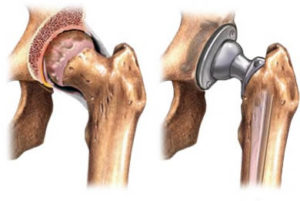Hip Replacement Surgery
Hip replacement surgery is also called as hip arthroplasty. In this surgery, the natural joint surfaces of the hip are replaced with artificial surfaces for better functioning and pain relief. Hip joint replacement in India is a very common surgery that is performed in even small clinics. So, when the same surgery is performed in a huge hospital, the quality of surgery and the functional outcome is much better. This is the reason for many patients even from outside India wanting to undergo hip replacement surgery in India.
Advantages of undergoing hip replacement surgery in India
1. Low cost of surgery:
The cost of hip replacement surgery in India is US $ 7,200. The same surgery costs double the amount in most other countries. In USA, the cost is US $ 57,000.
2. No waiting time:
The surgery in India can be done immediately after all the diagnostic procedures are completed and there will be no waiting time. The waiting time in most other countries range from 3 months to more than a year.
3. Comparable care:
The medical and nursing care for the person undergoing surgery is on par with the best care in your own country. In face the care in Indian hospitals is said to be more personalized.
4. Many choices of hospitals and cities to undergo surgery:
You can undergo Hip replacement surgery in India in one of the many different cities of India. Each city will have many hospitals that you can choose from. So, the unlimited number of choices provides you the opportunity to get the best care you require.
5. Alternative medicine therapy:
You can also undergo alternative medicine therapy like Ayuveda, Homeopathy and others during your recuperation period.
Hip replacement surgery procedure
When a doctor talks of hip replacement for you, he wants to replace the natural ball on the top of the femur bone with a metal ball or the socket in the hip bone with a replacement. At times, the hip replacement surgery may mean replacement of both the joint surfaces with a prosthetic.
Types of hip replacement surgery in India
1. Total hip replacement:
In total hip replacement, the both surfaces of the joint are removed and a prosthetic hip joint is placed in its place. Total Hip Replacement is indicated in many people with severe arthritis that has been present for long time. Total Hip Replacement will also have better health benefits.
2. Partial hip replacement:
Either one of the articular surfaces of the joint will be replaced for you. This will be based on the damage that has occurred to any one surface in the joint. It could be the head of the femur or the cup like structure in the hip bone.
3. Double hip replacement:
If both your hip joints are damaged, then they could both be replaced at the same time. This is called as double hip replacement. It is not commonly done as it is usually preferred to get one surgery done and dusted before starting the other one. This is because it will help you to cope better and have a good gait pattern.
4. Minimally invasive hip replacement surgery:
In this kind of surgery, the incision made for the hip replacement will only be 2 inches. The advantage of this method over the conventional methods is the short hospital stay and early discharge.
Diagnostic tests before hip replacement surgery
1. Bone Density test:
A bone densitometer is used to measure the density of the bones in your body. This is extremely important to check the existing strength of your bones because weak bones can cause poor prognosis after sugery. This test helps to identify those who are suffering from Osteoporosis.
2. CT Scan & MRI:
A Computed Tomography (CT) and Magnetic Resonance Imaging (MRI) are useful in diagnosing the various diseases of the hip joint. It also shows the present condition of the hip joint and helps in deciding if hip replacement surgery is necessary for a person.
3. Arthrogram:
Hip Arthrogram helps in identifying diseases of the hip joint, if it is present. Hip arthroscopy may be tried in few patients, with some benefits
Benefits of hip replacement surgery and Why hip replacement surgery is necessary?
1. Reduction in pain over the hip joints because of the mechanical implant.
2. Ability to become fully functional and independent due to pain relief.
Pain relief and independent functioning are the two major benefits that you will have after recuperating from your hip replacement surgery. Your pain will decrease completely because the damaged hip areas are removed. You will also have better movement because of the mechanical parts that are fitted in the hip joint.
Who can undergo hip replacement surgery?
1. Patients who are immobile due to severe hip pain due to injury or hip arthritis.
2. Those who are not able to move the hip joint due to Hip arthritis like Osteoarthritis.
3. People with poor quality of life because of immobility caused by hip joint damage.
4. Those who have hip and back pain together and those with hip and knee pain together may also benefit.
Who cannot undergo hip replacement surgery?
1. Heart disease that is very severe could be a contraindication for hip replacement surgery.
2. Any infection in any part of the body is a contraindication till the infection is controlled.
3. High blood pressure or uncontrolled diabetes has to be controlled before surgery.
4. General weakness and severe debilitating diseases have to be rectified before surgery. This is to ensure quicker rehabilitation after the surgery.
Dangers associated with hip replacement surgery
There are a few risks associated with hip replacement surgery. The main risk is the formation of blood clots. These clots can form during of the post surgical rest period. They can form in the veins of the leg. These veins are dangerous as the blood clots formed in the veins of the leg can travel in the blood stream. When they reach the artery in the heart, lung or brain, they can become fatal.
Precautions in various activities after hip surgery
After a hip replacement surgery, you should ensure the following precautions are taken while sitting.
Do not sit for long time in the same position.
Avoid cross legged sitting.
Sit in a comfortable chair and in one that has adequate support for your back.
Do not sit in a chair that is not stable and can cause you to topple. If it topples, you will put undue stress on your operated hips and can damage it too.
When you are standing from sitting position, use the arms of the chair as support. You can also hold on to other stable objects while getting up.
Precautions while climbing stairs after a hip replacement surgery
While climbing up the stairs, you should put the unoperated leg up first
When you are going down the stairs, you should put the operated leg down first and then the unoperated one.
After a hip replacement surgery, you should ensure the following while taking bath.
You can stand and bathe or sit on a stable chair.
Make sure that the bathroom floor is not slippery.
Do not bend and do not stress your hips
Other general precautions during activities
After a hip arthroplasty, there are some general instructions that you need to follow. Taking these precautions after hip replacement surgery will help you to protect the hip and give it long life.
1. Walk with small and firm steps
2. Use walking aids like crutches or walkers, till you are told to get rid of them.
3. Do not put more weight, on the leg while walking, than what has been instructed.
4. Driving is to be avoided till the surgeon gives the all clear!
5. Do not walk fat, even if you are in a hurry.
6. Follow the instructions of your surgeon and physical therapist.



